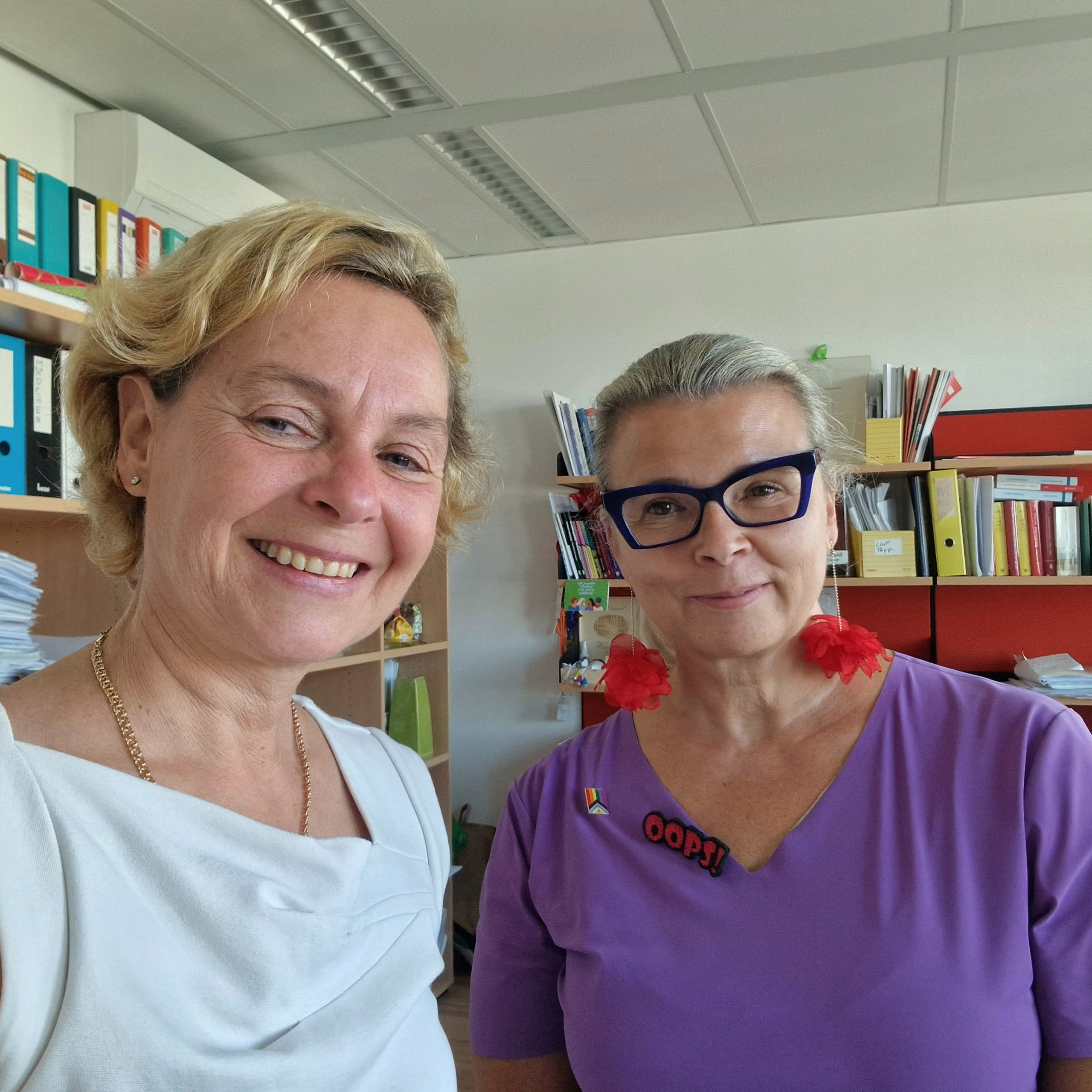In an interview with Ms. Appiano-Kugler, Head of Labour Market Policy for Women at the AMS, she impressively shows how strongly gender equality work and corporate culture can shape the success of an organization – and what challenges arise from this.
For over 30 years, the AMS has pursued a consistent strategy to specifically promote women and enable them to take up management positions. The result is remarkable: with a stable proportion of women in management roles of around 55%, the AMS is considered a pioneer in public administration. This development is no coincidence, but the result of a clear legal framework, such as the Federal Equal Treatment Act, and a determined human resources development strategy that aimed to utilize the full potential of women from the outset.
At the same time, Ms. Appiano-Kugler makes it clear how demanding and stressful the work at the AMS is – especially for advisors. They face complex challenges every day that go far beyond traditional job placement. Whether homelessness, debt, illness, addiction problems or family crises: AMS advisors are often the first point of contact for people in difficult life situations, although many of these issues would actually require several institutions at the same time. This complexity requires a high degree of empathy, intuition and social skills. The pressure is enormous because conversations are often conducted in extremely short time frames while organizational tasks have to be completed at the same time. There is a risk of exhaustion and excessive demands, despite a high level of motivation.
Added to this is the lack of resources that has existed for years. Although pilot projects have shown that more staff could even save costs in the long term – for example, because more intensive support gets people back into work more quickly – additional positions are difficult to push through politically. The AMS is systemically relevant, which was particularly evident during the coronavirus crisis, when masses of applications had to be processed in a very short space of time. This burden could only be mastered thanks to the extraordinary commitment of the employees, which impressively underlined the importance of the AMS as a supporting pillar of the Austrian labor market.
Another defining aspect is constant change. The AMS works in an environment that has to constantly adapt to new laws, political requirements and social developments. “Change management is not a project at the AMS, but part of everyday life,” says Ms. Appiano-Kugler. “Anyone who works at the AMS has to like this dynamic and be prepared to continuously develop.”
Despite these challenges, the AMS is an attractive employer that stands for stability, fair pay and family friendliness. For women and single parents in particular, it offers a working environment that enables and actively supports compatibility. This interplay of meaningfulness, responsibility and security makes the AMS a special organization: “It is a workplace for people who are looking for diversity, change and real responsibility – and at the same time an example of how corporate culture and equality can be lived sustainably in a public company,” describes Ms Appiano-Kugler.
Where does your strong commitment to empowerment come from, Ms. Appiano-Kugler?
“I grew up in Upper Carinthia in a strongly patriarchal environment, and it was clear to me very early on that I didn’t want to accept these structures, I wanted to overcome them,” she says. “This attitude has shaped my entire life and my commitment to equality and social justice. It’s clear to me that where diversity and inclusion are lacking, discrimination and injustice arise – that’s why I’m fully committed to fair opportunities and the protection of vulnerable groups.”
Ms. Appiano-Kugler shows how her own educational path and success depended on structures, as she would not have been able to study without the social democratic reforms of the Kreisky era. “Even today, our education system is elitist, selective and wastes the potential of many children who do not come from privileged families,” she summarizes.
A key issue is the discrimination of women: Female socialization often acts like a Stockholm syndrome: many women still believe they are automatically responsible for unpaid work. Pregnancy and childcare become lifelong disadvantages, while women’s pensions are on average only 40 percent of those of men. Empowerment means determining who I am myself.
In the interview, Ms. Appiano-Kugler mentions two key areas for her:
She is particularly critical of the fact that unpaid work forms the foundation of our society, but is neither visible nor fairly valued. Even in households where women do more paid work than men, they also do more unpaid work – an imbalance that is rarely questioned.
For Ms. Appiano-Kugler, the education system is also emblematic of these injustices: It focuses on weaknesses instead of potential and demotivates many young people, who then end up frustrated at the AMS. In addition, there is a worrying shift to the right in society that calls women’s rights and democracy into question – values that should have long been beyond dispute.
My motivation is empowerment, but not as a buzzword, but as an attitude: “I decide who I am, I demand solidarity among women and a clear political stance,” says Ms. Appiano-Kugler, underlining her position. Change requires courage, awareness – and the will to consistently question traditional role models.
How do you live empowerment at the AMS?
For Ms Appiano-Kugler, empowerment is not just an individual concept, but also plays a central role in the organizational culture of the AMS. She describes the cooperation in her team and throughout the company as being characterized by a high level of intrinsic motivation: Employees are united by the goal of advancing equality in the labor market, combating discrimination and advocating for inclusion. This shared set of values lends meaning to the work and promotes strong commitment.
Appiano-Kugler emphasizes that there is a culture of open exchange at the AMS. Decisions are rarely made alone, but are usually the result of an intensive discussion process. Despite clear hierarchies, the organization is strongly characterized by grassroots democracy:
Ideas and suggestions can be submitted from any level and there is open access to managers – right up to the Management Board. This open-door policy makes it possible to raise concerns directly and develop solutions together.
It is particularly important for them that the AMS acts not only as an authority, but also as a “link” between companies and employees. This role requires a pragmatic, fact-oriented attitude, beyond ideological trench warfare. She appreciates that this approach is practiced at the AMS: If a measure makes sense, it is implemented regardless of its origin.
Ms. Appiano-Kugler also addresses her personal management philosophy: She focuses on composure, self-reflection and consciously dealing with challenges. Instead of falling into a hectic rush or drama, she recommends rethinking decisions and approaching conflicts with caution. She has shaped this attitude during her many years at the AMS, where she has worked for over three decades, including many years in a management role.
She also provides insights into her involvement outside the AMS, for example as a member of the supervisory board at ÖBB or on the board of the Women’s Rights Protection Fund. These activities enable her to gain new perspectives and introduce topics such as sustainability, equality and diversity to other organizations. In her role, it is important to her to combine leadership and organizational culture in such a way that the topics of meaningfulness, open communication and the willingness to continuously develop are given equal importance.
Your personal stress tip:
If I think I have a problem now, then I ask myself: will it really be a problem in 5 years’ time, if it’s not a problem in 5 years’ time, then I don’t have a problem!
Viktor Frankl (“my great hero”) is very helpful here, and 2 sentences in particular have left their mark.
“You can’t let yourself put up with everything” and
“You shouldn’t believe everything you think.”
“Then I think to myself, no need to panic”. It usually helps Ms. Appiano-Kugler to sleep on very difficult topics for a night. The most important message is not to reply immediately if something upsets you. You can write and reply, but don’t send it away. I realize that the next day I write the mail completely differently.





